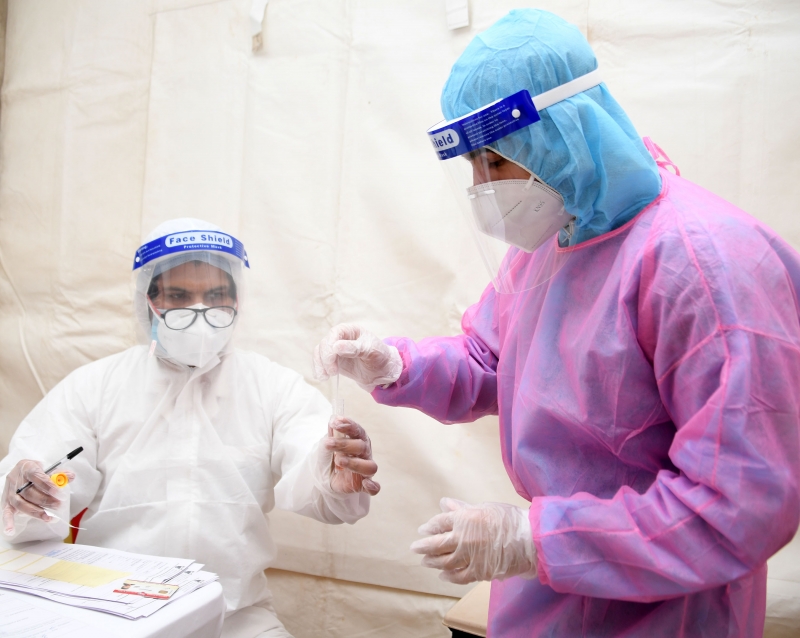Bahrain : More people recover from COVID-19 infection, stable cases now at 1008
TDT | Manama
Bahrain yesterday confirmed the recovery of twenty-three more people from Coronavirus (COVID-19) infection in the Kingdom, bringing the total number of recovered cases here to 726. The Kingdom, which has one of the highest testing rates per capita in the world, tested a total of 79,612 people for COVID-19 symptoms as of yesterday.
Methods employed include selecting citizens and residents randomly to test for the Coronavirus (COVID-19), on a daily basis, as part of a comprehensive national response to the global spread of the virus. Out of the 1011 confirmed COVID-19 cases reported, 1008 individuals are stable, while three are in critical condition. Total recorded deaths from Coronavirus infection, as of now, are seven.
The Ministry of Health statistics also indicates that Bahrain, which recorded its first COVID-19 case on February 24, when a school bus driver who had recently travelled home from pilgrimage in Iran by way of Dubai tested positive, is highly successful in limiting the spread of the virus, even as the world battles rising number of cases. Bahrain also garnered the recognition of the World Health Organisation for its agile response. According to Johns Hopkins University data, Governments throughout the GCC — Bahrain, Saudi Arabia, Qatar, Oman, Kuwait and the United Arab Emirates — have enacted some of the world’s strictest measures, including suspending passenger flights and imposing curfews on citizens to put brakes on the number of new cases of COVID-19 that currently total over 2 million globally.
A CNBC report credits Bahrain’s success not only to the lockdown measures employed but also to the deployment of sophisticated technology, ensuring that movement is limited and social distancing is in place. The report also states that Bahrain’s ‘BeAware’, which allows residents to track proximity to someone with COVID-19, are contributing greatly to the government’s effort to battle the virus. The application uses location data to alert individuals in the event they approach an active case.
The stringent measures, which have slowed down the rate of infection, had also made Bahrain one of the first few nations in the world to ease restrictions, allowing some of the stores and malls to reopen. Shoppers and employees are required to wear masks while outside, a Ministry of Industry, Commerce and Tourism statement said. Failing will attract a fine of BD 10,000 and a three-month jail term. Public gatherings over more than five people are also prohibited, and everyone is urged to stay at home unless necessary, the ministry added. Among Bahrain’s neighbours, Saudi Arabia, which reported the highest number of cases in the GCC (7,142) is on an indefinite curfew.
The United Arab Emirates is using AI to limit the movement of residents with police in Dubai using a programme called “Oyoon” to monitor the situation through a network of cameras. UAE, as of yesterday, had over 5,800 COVID-19 cases. Kuwait reported 1,658 cases and Oman 1,069 cases. Bahrain was also the first Arab country to join the WHO’s “Solidarity Trial” to find effective treatment for the virus.
Seize the opportunity: WHO
Meanwhile, the World Health Organisation yesterday urged the Middle East and North African governments to “seize the opportunity” to combat the coronavirus while numbers of cases in the region are still relatively low.
“We have to seize the opportunity to act in the region because the rise in cases was not so rapid,” Yvan Hutin, director of the communicable diseases department at WHO’s Eastern Mediterranean office in Cairo, said in an interview.
In the region at large, which for WHO stretches to Afghanistan, around 111,000 cases of the novel coronavirus have been recorded and more than 5,500 deaths. That accounts for a small proportion of the more than two million cases and over 150,000 deaths declared worldwide from the pandemic. Hutin said it is hard to pinpoint a specific reason for the discrepancy. “There may be demographic factors at play because we are dealing with youthful populations” in the region, he said, referring to the heavier death toll from COVID-19 among the elderly.
In conflict-ridden countries or “emergency situations” such as Libya, Syria and Yemen, low numbers have been reported. But according to the epidemiologist, “just because we avoided a difficult situation the first time around, that doesn’t mean that it will stay like this”. In Egypt, where Hutin led an assessment team last month, “it is clear that we have more transmissions now than a few weeks ago. But it still hasn’t reached an exponentially proliferating rate of transmission”.
Avoiding explosion
To avoid a situation comparable to Europe or the United States with tens of thousands of deaths, Hutin said several inter-related responses were needed. These include “community engagement, mobilising entire health systems and preparation of hospitals for the arrival of severe cases”.
“The things that can be done are not necessarily very complicated,” he said, such as isolating patients with mild symptoms “in hotels, schools or army dormitories”. For severe cases, “there is a lot that can be done such as transforming conventional hospital beds into intensive care ones”.
Another measure to avoid an explosion of COVID-19 cases in the region would be to increase the capacity for testing. This can be done with “small machines that can give quick test results”. With the holy month of Ramadan starting next week, when people gather to break daytime fasts, WHO has published a string of recommendations urging that social distancing be maintained.
Related Posts

